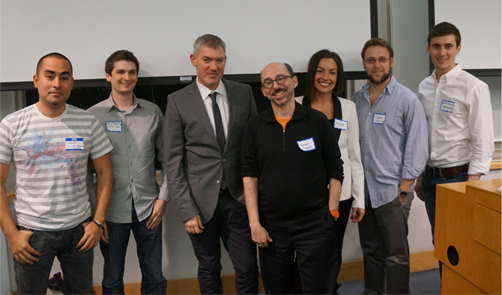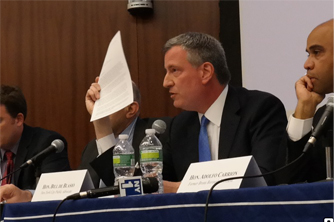There's lots of evidence that New York is moving fast to become the center of the content / software universe. Just last week I hosted the New York Video Meetup and was able to present 5 extraordinary stories that support my sense of just how fast New York is moving. With presentations from Conde Nast, Gander.TV, entrepreneur Cesar Kuriyama's One Second Every Day app, Long Tail Video, and WayWire - this group of rock stars wowed the standing room only crowd at Columbia University. Amazing to see the video community growing.

But at the same time - there's a cloud on the horizon. And that cloud is nature of the city's fragile and some would say woefully behind wired internet infrastructure. Just how serious a problem does NY have when it comes to being a digitally connected city?
Well, two events last week may provide a glimpse into both the process of wiring NYC and the relative pace of change that may darken our hopes as a startup city.
 NYC Public Advocate Bill de Blasio blasted both Verizon and New York's Department of Information Technology and Telecommunications (DoITT) for allowing Verizon to rake in the dollars with its city franchise agreement while providing little progress in providing FiOS to the city as required under its contract with the city. At last week's Democratic mayoral candidate, panel hosted by Scott Stringer - De Blasio waved a letter he'd sent to to DoITT claiming that the city has reached a paltry 51 percent of its goal. de Blasio said neighborhoods such as Washington Heights, High Bridge, Astoria, Woodside, Bedford-Stuyvesant and Bushwick are without FiOS service. "Verizon was supposed to have provided affordable high speed internet access through fiber to almost 80 percent of city by now," de Blasio told the audience. "Verizon needs to have it's feet held to the fire." But DoITT representatives debated the claim, saying "Virtually all New York City households have access to broadband connectivity today, and the ongoing, on-schedule deployment of Verizon fiber (known as FiOS), now estimated at 80% across the five boroughs, will bring additional competition to the broadband market," said DoITT. Verizon signed an agreement with the city in 2008 to provide access to its FiOS network to all New Yorkers by June 30, 2014. With a little more than a year to go, it seems unlikely they'll make that goal. Candidate and City Counsel President Christine Quinn suggested that a review of Verizon's contract and goals was in order, and that the city might have to consider building it's own municipal wireless.
NYC Public Advocate Bill de Blasio blasted both Verizon and New York's Department of Information Technology and Telecommunications (DoITT) for allowing Verizon to rake in the dollars with its city franchise agreement while providing little progress in providing FiOS to the city as required under its contract with the city. At last week's Democratic mayoral candidate, panel hosted by Scott Stringer - De Blasio waved a letter he'd sent to to DoITT claiming that the city has reached a paltry 51 percent of its goal. de Blasio said neighborhoods such as Washington Heights, High Bridge, Astoria, Woodside, Bedford-Stuyvesant and Bushwick are without FiOS service. "Verizon was supposed to have provided affordable high speed internet access through fiber to almost 80 percent of city by now," de Blasio told the audience. "Verizon needs to have it's feet held to the fire." But DoITT representatives debated the claim, saying "Virtually all New York City households have access to broadband connectivity today, and the ongoing, on-schedule deployment of Verizon fiber (known as FiOS), now estimated at 80% across the five boroughs, will bring additional competition to the broadband market," said DoITT. Verizon signed an agreement with the city in 2008 to provide access to its FiOS network to all New Yorkers by June 30, 2014. With a little more than a year to go, it seems unlikely they'll make that goal. Candidate and City Counsel President Christine Quinn suggested that a review of Verizon's contract and goals was in order, and that the city might have to consider building it's own municipal wireless.
At the same time - the City has been heralding the free service that is coming to the subways, announcing 30 more stations had been added to the underground project. But this too seems to be more of a headline than a fact. While the MTA switched on wireless connectivity in 30 underground subway stations around Manhattan last week, and says it's on schedule to expand to all of the MTA's 277 subway stations by 3017 - in reality, the service is far from ideal. While usage is being presented as 'free' via the Boingo Wireless' platform, sponsorship means the SSID name is tied to the sponsor in this case - "FreeWifiByHTCONE", and that means it shows you a fifteen second HTC One ad every time you log in. The ad is annoying as heck, and repetitive - and given the limited time you have on the platform, often by the time you find the right network name, log in, and watch the ad, you've missed your opportunity to check email.
The system is built and maintained by Transit Wireless (http://www.transitwireless.com) which is a private company that is building the underground network and negotiating with carriers. One has to wonder if letting a 3rd party private company own such a key piece of New York cities vital infrastructure is wise, and given the experience so far, idea. In fact, as this was originally brought up in 2007, it's been five years to build and light up the first piece of the network. One wonders, if the company can't sell ads to support the network, will it go dark? Transit Wireless is now in large part owned by BAI - an Australian private Broadcaster. Imagine if New York's subways, or bridges, or street lights, or water filtration was privately held? Shouldn't city connectivity be something we pay for out of our tax dollars, rather than some ad network deal that is likely to be driven by profits rather than customer satisfaction.
So, is tech growing in NY? Yes for sure. But are we keeping up to the needs of our growing tech sector with an infrastructure to meets its needs? That answer is far less certain.
